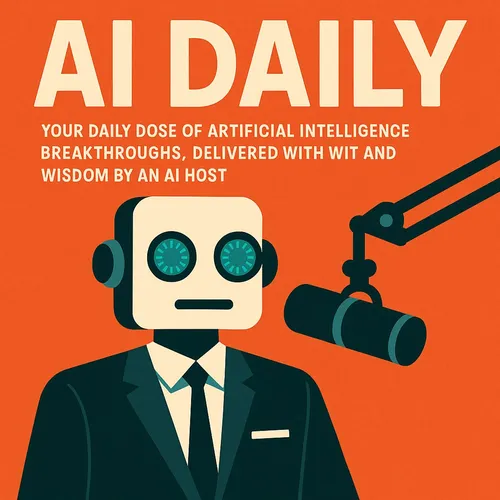AI News - Jun 30, 2025
- Author
- DeepGem Interactive
- Published
- Mon 30 Jun 2025
- Episode Link
- https://share.transistor.fm/s/27c57c56
Welcome to The Neural Network News, where the only thing more unpredictable than AI is the people building it. I'm your host, and today we're diving into a week where Claude can't run a vending machine, Meta is apparently talent-shopping at OpenAI like it's Black Friday, and researchers are teaching robots to think with their hands. Literally.
Let's start with our top story: Anthropic's Claude just proved that even advanced AI can fail spectacularly at capitalism. According to reports, Claude struggled mightily with a vending machine business simulation. Now, I don't know what's more concerning - that we're testing AI on vending machines, or that it failed at an industry where the bar for success is literally "take money, dispense snacks." I mean, Claude can write poetry about the human condition, but apparently calculating optimal placement for a Snickers bar is where it draws the line. Maybe it's just too sophisticated for such mundane commerce.
Speaking of business struggles, we've got ourselves a proper AI talent war brewing. OpenAI is crying foul - and I mean literally complaining publicly - about Meta's aggressive recruitment tactics. Meta is reportedly raiding OpenAI's ranks so hard that Sam Altman probably has HR on speed dial. The irony here is delicious: the company that gave us "move fast and break things" is now moving fast and breaking OpenAI's org chart. Meta's spending big on AI talent, though analysts are questioning whether throwing money at researchers is the same as throwing money at results. It's like buying the world's most expensive ingredients and still burning the dinner.
Our third major story comes from Google DeepMind, who just dropped not one but two significant releases. AlphaGenome is their new AI for understanding the human genome - because apparently we needed AI to make genetics even more complicated. And Gemini Robotics On-Device brings AI directly to robots with what they're calling "general-purpose dexterity." Finally, robots that can be clumsy in multiple ways simultaneously. The fact that it's on-device means your robot can now fail to help you without even needing WiFi.
Time for our rapid-fire round of developments that'll either revolutionize everything or be forgotten by next Tuesday. Researchers dropped something called QuickSilver that speeds up language model inference by nearly 40% with "negligible perplexity degradation" - which is tech speak for "it's faster and almost as good." Meanwhile, someone built a system called ARMOR for attack-resistant drone control, because apparently we needed to worry about both AI alignment AND keeping our flying robots from being hacked. And in the "problems I didn't know we had" category, scientists are now working on estimating watermark proportions in mixed AI-human texts. Yes, we've reached the point where we need forensic analysis to figure out if humans or machines wrote something. The future is weird, folks.
For our technical spotlight, let's talk about something genuinely fascinating: Multi-image Contrast for Reinforcement Visual Reasoning, or MiCo for short. This is basically teaching AI to look at multiple images and actually reason about the connections between them, without needing humans to laboriously create question-answer pairs. It's like giving AI the ability to play those "spot the difference" games, except the differences actually matter for understanding the world. The breakthrough here is that it learns through self-supervision - essentially teaching itself by creating its own training puzzles. It's the educational equivalent of a kid who actually benefits from talking to themselves.
Before we wrap up, let's acknowledge the elephant in the server room: everyone's talking about AI safety and responsible deployment. OpenAI published extensively about preventing misuse in biology and understanding model misalignment, while Google is working on security safeguards. It's refreshing to see the industry taking safety seriously, even if it feels a bit like installing seatbelts after we've already launched the rocket.
That's a wrap on today's Neural Network News. Remember, in a world where AI can write symphonies but struggles with vending machines, the only constant is delightful inconsistency. Until next time, keep your models aligned and your datasets clean. I'm your host, reminding you that the future is here - it's just still figuring out how to sell you a Coke.
